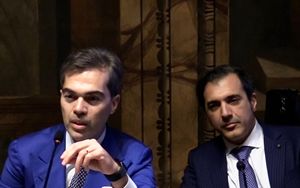(Finance) – “It is not negative choices that transform society but positive choices. Political choices regarding sustainability must not penalize workers and businesses but must reward environmentally sustainable behavior through significant tax breaks and public investments. All choices must be mediated in the field, they cannot be dogmatic. We need to bring the political decision-maker closer to those who, every day, face the price of environmental choices in the field. If you choose to be environmentalists in Europe, Europe must then demand it from the rest of the world.” He declared it Angel Bruscinopresident of Confapi Campania And Confidence SMEsauthor of the book “Possible environmentalism, Green deal, Pnrr and energy transition: the great transformation of the Italy of the future”, published by Historica Giubilei Regnani, during the presentation which took place in the Serpieri room of Confagricoltura in Rome .
“The green new deal and theenvironmentalism in particular they must overcome ideological currents. Environmentalism must become a secular religion available to all that governs the economy and political choices and must help us transform society in the direction of growth and the production of well-being. Even paying higher costs for some choices that must guarantee that they turn into a benefit for future generations.”
The meeting opened with a message from Vannia Gava, Deputy Minister of the Environment: “The winning word for the future of our country and economies in general is sustainability. It is unimaginable to pursue the necessary environmental protection and decarbonisation objectives collectively undertaken through policies of social impoverishment and industrial desertification. The Ministry of the Environment and Energy Security and the Italian Government are committed to European and international discussions to promote a vision that is as much as possible oriented towards the right balance of the different variables that make up the complex transition path, assuming challenging objectives, but that are sustainable, aware of the duty to accompany our communities and our industrial systems towards reconversion and a new cultural sensitivity”.
For Alessio Postiglione, co-author of the book: “Environmentalism, to be possible, must find the balance between environmental sustainability with social and economic sustainability. Today we are often confronted with an ideological environmentalism that proposes degrowth and is sometimes against businesses and farmers. Instead we need to make our economy more efficient and fair so that it looks to the interests of future generations. The balance between environment and industrial development is complex and dynamic, it must be talked about publicly by informing citizens. The costs of the energy transition cannot be at the expense of businesses and workers. If we are talking about a public objective, we need adequate industrial policies that tend to support the transition”.
She focused on the need to involve the young generations Simona Belshazzar, councilor of the Lazio Region for youth policies: “The green deal involves young people who are passionate about the topic of environmental protection. But we need to explain to them that we don’t need extreme religions but we need to believe in healthy environmentalism, not that of eco-vandals. Let’s teach them the culture of respect for the environment in a healthy and not extreme way.”
Landlord representing Confagricoltura Donato Round, director of the sustainable development area: “We need to make a major effort after what has happened in recent weeks. The green deal and the common agricultural policy were planned before Covid and the wars. Today there is a need to update them and gradual adoption of some interventions is needed which risks causing businesses to lose competitiveness”.
During the conference the dossier “Green Italy“. The challenge between environmental policy and energy innovation, for Nazione Futura, edited by Ciro Miale. “The energy transition is the challenge of challenges. In our dossier – underlined Miale – we have explored the Energy and Climate plan presented to Europe by Italy in June 2023 with approval expected by June 2024, and we have explored the topic of RePower EU in the remodulation of the Pnrr which allocate over 11 billion euros for the decarbonisation of production processes and for the installation of photovoltaic and wind systems, also providing incentives for energy communities”.
Second Serena Bianchini, Ferpi Lazio delegate: “The theme of environmental communication becomes fundamental when talking about sustainability because in this case it extends to politics, society and the economy. It must therefore necessarily be managed by professionals who are experts in crisis communication and who know how to work well with such delicate issues”.
Lorenzo Castellani, professor at Luiss, underlined that “power is becoming increasingly technical and bureaucratic to the detriment of medium and small businesses in traditional sectors. We need to understand this phenomenon well to understand the risks and avoid centralist and dirigiste planning tendencies that penalize those who produce and those who work.”
